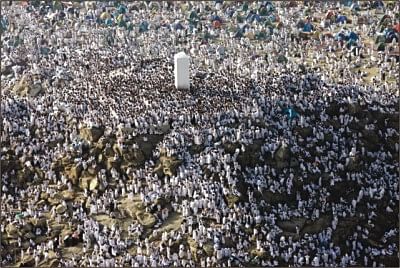Over 2m hajj pilgrims seek mercy at Arafat

More than two million Muslim pilgrims from across the globe gather around Mount Arafat, southeast of Makkah, to perform hajj yesterday.Photo: AFP
More than two million Muslims from across the globe gathered yesterday around Mount Arafat near Makkah, the birthplace of Islam for the annual hajj.
At Arafat, in western Saudi Arabia, a massive crowd of the faithful spent the day praying and asking for Allah's forgiveness, in a symbolic wait, or "wuquf", for the final judgement.
Among this year's pilgrims is Iranian President Mahmoud Ahmadinejad, invited by Saudi King Abdullah to become the first president of the Islamic republic to take part.
Ahmadinejad was due to have joined Iranian pilgrims at Arafat but an announcement at the gathering said that "due to the heavy traffic, the president was not able to make it."
Men wearing two pieces of unstitched white cloth, called the Ehram that Muslim tradition says will serve as their shrouds, and women entirely covered apart from their face and hands tirelessly repeated the formal refrain.
"I am here in response to your call, Lord, I am here," they cried, many of them in heavily-accented Arabic, gathered on a plain dotted with hills.
"This is the first time I am doing the hajj. I registered with the hajj organisation five years ago," said an elderly woman called Fatemeh, accompanied by her husband.
It was on Mount Arafat -- also called Jebel ar-Rahma, or Mount Mercy -- that the Prophet Mohammed gave his final sermon more than 14 centuries ago.
A total of 1,707,814 pilgrims from 181 different countries have travelled to Saudi Arabia for the hajj, Interior Minister Prince Nayef bin Abdul Aziz said, joined by hundred of thousands of Saudis and other residents of the kingdom.
Ahmadinejad was to join other pilgrims in carrying out a series of other sacred rituals, such as walking counter-clockwise seven times around the Kaaba, the cube-shaped structure at the Grand Mosque in Mecca.
His pilgrimage has an added significance because of the sometimes rocky relations between Shiite Iran and Sunni-dominated Saudi Arabia.
An Iranian demonstration during the hajj in July 1987 led to Tehran and Riyadh breaking diplomatic relations. Security forces tried to break up the protest and 402 people, including 275 Iranians, were killed.
Iranian pilgrims stayed away from the hajj until 1991.
They have since held peaceful anti-US demonstrations inside their hajj compound, during which a message from Iran's supreme leader Ayatollah Ali Khamenei is read out.
Khamenei this year urged Muslims to stand united against world "arrogance," Tehran's reference to the United States.
"All the Islamic nations and especially their scholars and intellectuals should create a united front against the world arrogance and solidify it day by day," Khamanei said.
At the Grand Mosque, the massive Kaaba monument was being draped in a new "kiswa", its silk cover adorned with Koranic verses embroidered in gold and silver-plated thread, costing more than five million dollars.
Muslims face the Kaaba when they pray five times a day.
At sunset on Tuesday, the faithful were to move toward Muzdalifah valley, several kilometres (miles) from Mount Arafat, to spend the night and collect pebbles to cast at columns in Mina symbolising the Devil.
On Wednesday morning, pilgrims flock Mina for the last part of the hajj -- the ritual stoning of Satan.
Later the same day, the pilgrims will sacrifice a beast, generally a sheep, in remembrance of the sacrifice Allah asked Abraham to perform by giving up his son to prove his devotion.

 For all latest news, follow The Daily Star's Google News channel.
For all latest news, follow The Daily Star's Google News channel. 



Comments